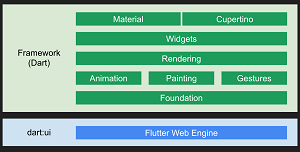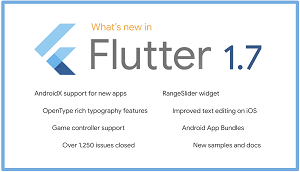News
Flutter 1.7 Supports AndroidX as Dev Team Struggles with Bug Reports Amid Popularity Hike
- By David Ramel
- July 15, 2019
Google's has update its Flutter open source, cross-platform mobile UI framework to version 1.7, sporting support for AndroidX, Android App Bundles enhancements and more.
However, the project's fast rise in popularity has resulted in an explosion in bug reports, stressing the bug system and the the dev team, which is seeking more staffing in that area and implementing other mitigation steps.
Flutter 1.7 supports creating new projects with AndroidX, Google's open source project used by the Android team to develop, test, package, version and release libraries within Jetpack, a collection of software components designed to help Android developers deal with common and difficult problems when creating mobile apps.
"Now that AndroidX is itself stable and many Flutter packages have been updated to support it, Flutter supports creating new Flutter projects with AndroidX, which reduces the work needed to integrate with other parts of the Android ecosystem," states a July 9 blog post by Flutter program manager Tim Sneath, a 17-year Microsoft vet who left that company in 2017 to take over the reins of Flutter.
Flutter has since sparked tremendous interest in the open source, cross-platform mobile development arena, reminiscent of React Native's popularity trajectory. Earlier this year, LinkedIn reported that Flutter expertise was the fastest-growing skill among software engineers on its platform, buoyed by its new unique approach that uses the Dart programming language, homegrown widgets, hardware acceleration and more.
 [Click on image for larger view.] Flutter Architecture (source: Google).
[Click on image for larger view.] Flutter Architecture (source: Google).
The fast increase in popularity has come with its own issues, however, as Sneath detailed in reporting the fixing of more than 1,250 issues that have arisen since the previous stable release as the dev team struggles to keep up with bug reports amid the burgeoning adoption rate of Flutter.
"With the rapid growth in Flutter, we're seeing lots of new issues reported, and to be transparent, the bug process that worked well when our project was smaller is not working so well now," Sneath said. "As a result, our open issue count has increased significantly over the last few months, despite our progress in closing triaged issues. We're working to increase staffing in this area, which will help with faster triaging of new bugs, closing and merging duplicate issues and redirecting support requests to StackOverflow.
In addition to the AndroidX support and bug fixes, Flutter 1.7 lets mobile developers create Android App Bundles -- a new Google publishing format that shrinks the size of app downloads -- in both 64-bit and 32-bit versions from a single submission. Google has decreed that, starting Aug. 1, all Android 9 Pie apps that use native code must come in 64-bit versions along with the traditional 32-bit versions to get published on the Google Play app store.
Updated documentation provides details on this, along with guidance for creating separate APK files for both 32-bit and 64-bit devices.
 [Click on image for larger view.]
Flutter 1.7 (source: Google)
[Click on image for larger view.]
Flutter 1.7 (source: Google)
Flutter 1.7 also comes with several new widgets and framework enhancements, as illustrated in the graphic above.
For Apple-centric developers, Sneath reported:
- Updates to Cupertino, the Flutter library for building iOS apps
- Improvements to the text selection and editing, whether iOS developers choose to use the Material or Cupertino design language
- A new sample that demonstrates how to make more significant platform adaptations across iOS and Android while retaining the same codebase
- Support for the new Xcode build system for developers on Mac machines
"Behind the scenes, you'll see lots of underlying work to create infrastructure towards enabling Flutter on macOS and Windows, with further support for important concepts like right-click and unique platform infrastructure such as MSBuild," Sneath added. "Support for non-mobile platforms is not yet available in the stable channel, however."
The latter comment alludes to Flutter's expansion from the mobile arena to Web and desktop development, announced at this year's Google I/O conference, as we reported in a May article.
Development of the Flutter SDK is done on GitHub.
About the Author
David Ramel is an editor and writer at Converge 360.